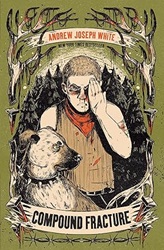by Andrew Joseph White
Peachtree Teen, 2024. 371 pages.
Review written November 19, 2024, from a library book.
Starred Review
I have gone back and forth many times as to whether to review this book. The folks who like the books I usually review shouldn’t take for granted that they’ll like this one. But let me say: The writing is stellar. The fact that I’ve been thinking about the book all day the day after I finished it says much about it.
My problem with the book? Well, it felt like a step too far when the protagonist’s friend was planning premeditated murder. It was justified! – and I didn’t like that either.
Now, the author walks the line with this incredibly well. Our protagonist is responsible for more than one death, but is not guilty of murder. And the book doesn’t end well for anyone who is guilty of murder. But there’s horrific violence here. And efforts that have been made to peacefully or politically overcome the bad guys – represented by the sheriff in this West Virginia county – are what ticks off that horrific violence. I feel like the message is: Sometimes the only way to overcome violence is with violence. And I don’t like that message or agree with it – even if it’s satisfying to see the evil ones lose in a fictional setting. (Not that the good folks aren’t traumatized along the way – I did warn you!)
The book has a wonderful sense of place, too, with pictures of coal miners on the endpapers. Miles Abernathy’s family has lived in Twist Creek County, West Virginia, for generations, and his great-great-grandfather led a coal miners’ strike – and was executed by the sheriff – the ancestor of the current sheriff – by hammering a railroad spike through his mouth.
As the book opens, Miles writes an email for his parents, telling them he’s trans, and then heads to a high school graduation party to show his friend Cooper photographic evidence he got from his dad’s safe that Sheriff Davies was the one responsible for the accident that caused Cooper’s mother’s death and Miles’ dad’s disability. Okay, that sentence was too long – but the book starts with Miles trying to do something for justice.
And that doesn’t end well. Miles gets brutally beaten and left for dead by the sheriff’s son and his two friends. In the hospital later, when Sheriff Davies talks to him, he has to pretend to have forgotten everything. But then in an encounter with one of his attackers, the other boy accidentally falls, hits his head, and dies. It was an accident, but Miles has no evidence – so Cooper helps him hide the body in the old mine. And from there… well, let’s just say that things escalate.
The author writes a letter at the front of the book, even while writing it hoping he’ll be able to change it before the book was published, but sad that he hasn’t been able to. Here’s part of that letter:
Instead, I have to write about how tough it is to be trans in America right now. By the time Compound Fracture is released, I’ll be twenty-six years old, and I’ll have seen bathroom bills, state-sponsored attempts to remove trans kids from supportive parents, crackdowns on gender-related care, and so much more. And if you’re disabled on top of it? Christ.
I guess what I’m saying is, I’m sorry it’s so difficult. We shouldn’t have to fight so hard to exist. We deserve better.
But, of course, this is a book about fighting as hard as you can. So please note that we’re going to deal with some difficult topics: graphic violence including police violence, transphobia, opioid use and withdrawal, and disturbing images. This is a book about an autistic, queer trans kid who loves his family and all the people who love him back . . . as well as all the people who want him dead. Actually, this book is kind of like moonshine. It’s gonna burn like hell going down….
If I promise you that this book has a happy ending, does that make it better? Does that make any of it easier to swallow?
And typing out that note reminds me of things I love about the book. Miles is a fully fleshed-out character and a great portrayal of an autistic, queer trans kid dealing with hard things as best he can. Another thing I love is the community portrayed in this book. There are loving parents also going through hard things, and in the end the whole community stands for what’s right.
But it’s a hard story along the way. And let me say again: Although it feels therapeutic to read about triumphing over hateful violence with violence, please don’t try this at home! I personally believe that nonviolence is more powerful in the long run.
But if this book can shine light on the injustice of targeting people who speak up against abuses of power? If it can show you a trans kid just trying to live his life (and the lovely imperfect way his family responds to his coming out)? – Then it’s doing good work.
Whatever else you think of it, this story will stick with you.
Find this review on Sonderbooks at: www.sonderbooks.com/Teens/compound_fracture.html
Disclosure: I am an Amazon Affiliate, and will earn a small percentage if you order a book on Amazon after clicking through from my site.
Disclaimer: I am a professional librarian, but the views expressed are solely my own, and in no way represent the official views of my employer or of any committee or group of which I am part.
What did you think of this book?
